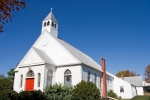March 23, 2016
From Scratch: Explaining Episcopal
 A few times a month for most of the last eight years, I have led a Bible Study at Century Regional Detention Facility, Los Angeles County’s main jail for women. It’s an environment where just about nobody knows what an Episcopalian is. I pass through nine locked doors and a security checkpoint, arrive in my assigned unit, and gather whoever is in the mood for Bible Study (or an hour out of her cell…). Fifteen to forty women sit in a noisy circle and wait for me to start. I have to explain Episcopalians, every time, completely from scratch.
A few times a month for most of the last eight years, I have led a Bible Study at Century Regional Detention Facility, Los Angeles County’s main jail for women. It’s an environment where just about nobody knows what an Episcopalian is. I pass through nine locked doors and a security checkpoint, arrive in my assigned unit, and gather whoever is in the mood for Bible Study (or an hour out of her cell…). Fifteen to forty women sit in a noisy circle and wait for me to start. I have to explain Episcopalians, every time, completely from scratch.
Here’s my spiel. I vary it a little each time, but the basic points seem to work pretty well:
- The Episcopal Church is a Christian Church. We believe in God and in Jesus and in the Bible. If you’re familiar with Catholic Church, our worship services look pretty similar. If you’re more familiar with Protestant churches, you will easily recognize the way we place a lot of emphasis on the Bible as the living Word of God, and draw on scripture to try to understand how we should shape and change our lives so that everything we do points towards God.
- Here are some things that set us apart from a lot of churches you may have experienced. We really try hard to be a church that has room for everyone. That means that our leaders and our members are men and women, people who are married and not married, have kids and don’t have kids, people who are gay and straight, people of different races and different languages and cultures, people with different kinds of mental and physical abilities. When you hear us criticized, it’s usually because someone thinks we have the doors open a little too wide. But we truly believe that God love us all and has placed gifts in all of us, and that the church is the richest when it can receive all those gifts and make space for people to use them.
- We’re not a church with a lot of rules. That makes some people suspicious. But God really just gave us two jobs to do, love God and love each other. God could have said, “Judge one another, as I will judge you,” but judging isn’t actually in our job description. God kept that one for Godself. So we try to let God be God and get about the business of doing our job: love.
- Being good at our job takes practice. Anything you want to do well takes practice. If you want to learn to play the piano, you’re not going to play something beautiful the first time you sit down. It’s true of anything hard: braiding hair, speaking a new language, learning to read, or learning to draw. If you want to do it well, you have to practice, and you have to be willing to make a lot of mistakes along the way. That’s why Jesus talks so much about forgiveness as being part of love. God shows love for us by forgiving our mistakes, and we have to find it in ourselves to forgive other people.
- Jail, incidentally, is a great place to practice neighbor-love. You have an awful lot of neighbors in a very close space, and they are not the people you would have chosen to spend this time with. No one is feeling or looking her best; everyone is pretty worried and stressed and everyone is missing someone or something on the outside. It’s an advanced test of neighbor-love, when some of us haven’t had much practice on the basics. But in here, when someone reaches out to you in love, it can change your whole life. Love matters a lot in here, even though it’s hard.
- So today for the hour we have together, we’re going to practice. We’ll practice loving God by singing and praying and praising and digging into that living Word, that has something new for us every time we read it and share it. We’ll practice loving each other by listening carefully and showing respect with our words and our looks and by encouraging each other and making room for each other in the circle and in the conversation and praying for each other. If you leave having spent an hour practicing loving God and loving your neighbor, we’ll all be just a little bit better at our most important jobs by the end of the day!
Does this sound like the Episcopal Church you know? How would you explain your church if you had to start from scratch?
Don't miss a blog post! Subscribe via email or RSS, using the grey box on the upper right.





